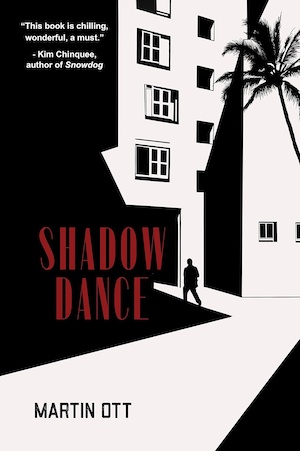Like gritty noir? If so then indie crime author Martin Ott’s new thriller may be right up your alley.
Buddy Rivet has ended several tours in Afghanistan, somewhat – no, a great deal – worse for wear. He just wants to get home to his girlfriend Dierdre in southern Louisiana. But before he’s officially mustered out, he punches a sadistic sergeant, flees, and tries to reenter civilian life.
Officially, he’s AWOL from the US Army, and they’ll want him back. When he finds Dierdre, she’s shacked up with his uncle Miles in the trailer she bought with Rivet’s pay. He takes off in Miles’s truck, travelling cross-country toward the disillusioning promise of California where his best friend Solomon St James is working as a DJ in a strip club.
Buddy, Dierdre and Solomon have one overriding common characteristic: they are masters at making bad decisions. They’re ideal material for a modern noir novel.
Solomon’s employer is the ironically named Club Paradise, owned by Big Z Pourali, head of an extended Iranian family. This is a family that believes it can write its own rules and does. The men are bullies, violent and abusive. The scheming, manipulative women – though attractive, unfortunately, to Solomon and Rivet – have their own agendas. It’s impossible to like any of them, except for the youngest, Iman, a mouthy preteen. Even Rivet’s friend Solomon is gliding down a path to almost certain destruction, dealing drugs and consorting with would-be gangsters.
It’s hard to like any of these characters. The most sympathetic, and the most deserving of sympathy, are the pole-dancers, who drift in and out of Club Paradise in some slow-motion dance of their own. Particularly the senior dancer of the lot, Alice, seems to be the only one with her head screwed on straight. The club’s regulars are a collection of misfits, too. They are people who will always be on the outside looking in, and their ambition to make a movie in the club basement after hours will surely come to nothing. Though these hopes are inspired by proximity to Hollywood, this set of would-be luminaries might as well be in Timbuktu.
Drugs, guns, alcohol and sex – what can go wrong? Pretty much everything. There’s never a dull moment in Rivet’s life. Since the book is written in first-person, you can assume he gets out the other end alive, at least, but an awful lot happens along the way. Ott keeps Rivet’s present situation from being overwhelming by a bit of backtracking, giving you a taste of what he had growing up. His parents, particularly his mother, were not nurturing types, but they were at least mostly there, running a gambling boat, until they were swept away in a hurricane. His military experience consisted of being a guard at a Bagram Airfield detention centre where he found better companionship with some of the prisoners than with his fellow soldiers.
While Shadow Dance is fairly bleak, there’s humour too, and the quality of Martin Ott’s writing lifts the story above its back-alley surroundings. Perhaps his facility with the language and interesting way of describing people and places comes from his having written several books of poetry. He makes Rivet a perceptive guide to this netherworld, and his descriptions of the Club Paradise and its denizens make them seem more sad than anything else. Object lessons, if only he’ll take them to heart. I liked Rivet, and I came to believe Club Paradise is only a temporary waystation on his journey to full adulthood. You just have to hope he does find himself, somewhere, soon.
Also try Reed Farrell Coleman’s Sleepless City or Gary Phillips’s Matthew Henson and the Ice Temple of Harlem.
Regal House Publishing
Print/Kindle
£7.49
CFL Rating: 4 Stars
Using our associate/affiliate links helps support the site.
